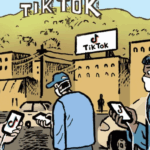 Cheetah Mobile is looking to lap up some brand dollars.
Cheetah Mobile is looking to lap up some brand dollars.
On Tuesday, the Beijing-based mobile app publisher announced a hook-up that will integrate Kiip’s rewards platform into its suite of apps, including a number of its most popular offerings: antivirus apps Clean Master and CM Security, battery life extender Battery Doctor and mobile game Piano Tiles 2.
Users will trigger rewards – either coupons or virtual currency – by completing actions within the app, such as achieving a high score within Piano Tiles 2, a dexterity test set to music.
The offers will be localized so that users see rewards in their spoken language. Offers can initially be redeemed via email, although Kiip is exploring the possibility of allowing Chinese users to save rewards to their WeChat or Alipay accounts.
The goal is to provide an alternative to display and drive retention, said Kabir Mathur, director of business development at Kiip. “Receiving rewards in-app will give users another reason to use the apps more frequently,” he said.
To date, Cheetah has monetized its roughly 635 million monthly active users mainly through app install ads within its native apps. After users run a scan using Clean Master, for example, they’re shown recommendations for other apps to download.
It’s been a lucrative business for Cheetah – the company generated around $600 million in revenue last year, and it’s projected to reach roughly $1 billion in 2016 – but “now we’re looking to move into branding and beyond performance,” said Arther Wu, Cheetah Mobile’s senior director of monetization and business operations.
In order to diversify, Cheetah will white label Kiip’s technology starting in Q2. Cheetah’s sales force of more than 100 people, including a number of GroupM vets, will start selling the product as Cheetah Moments across the Asia-Pacific region.
These so-called “moments” are an opportunity to brings brands on board, said Brian Wong, CEO and founder of Kiip, which has relationships with Coca-Cola, The Home Depot, McDonald’s, Pepsi, Capital One and other large US brands.
“Cheetah’s Battery Doctor app can detect battery usage, so it knows when someone’s battery is low and maybe it’s also the end of the day – that’s a moment of exhaustion,” Wong said. “There’s no reason why a brand like Red Bull, for example, couldn’t own that moment or why someone who has the time to run a scan with Clean Master wouldn’t be interested in reading something or watching a show. We’re starting to package this up.”
The challenge is getting brands to buy in. Cheetah’s sales team will start by reaching out to Kiip’s existing multinational client base – the sort of brands that would have an interest in China – and work from there to bring on more regional brand advertisers.
There’s already been some interest. Nike Japan has signed up to test a branded rewards product in the next few weeks.
On the other side, Kiip will become the exclusive seller of Cheetah Moments in the US. More than 50% of Cheetah’s install base is outside of China, with roughly 25% of traffic coming from the US.
Cheetah is also in process of integrating branded video into its first-party apps, including recent campaigns for Nissan and L’Oreal in Battery Doctor. That effort will expand in Q2.
“We will have a lot of branding inventory soon,” Wu said, noting that Cheetah is looking to get more advertisers using the audience targeting capabilities of its ad platform.
Cheetah burst on the scene in 2015 with a series of ad strategy investments. It spent $58 million to acquire French mobile ad company MobPartner in March 2015. A week later, it took the lead in a $24 million investment in Facebook ad partner Nanigans, which made Cheetah inventory available to Nanigans clients. Cheetah also uses Nanigans to run retargeting and re-engagement campaigns on social channels.
Cheetah Mobile’s overarching ambition is to become “one of the top five mobile ad vendors in the world,” CTO and President Xu Ming previously told AdExchanger.
For Kiip, China has been on the road map for a while – but it’s hard nut to crack. Cheetah’s scale is a way in.
“It’s easy to think about China as a magical land full of tons of people and tons of mobile activity, but practically speaking, it’s tough,” Wong said. “There’s are so many different partners to work with and it’s a hard market to understand.”












